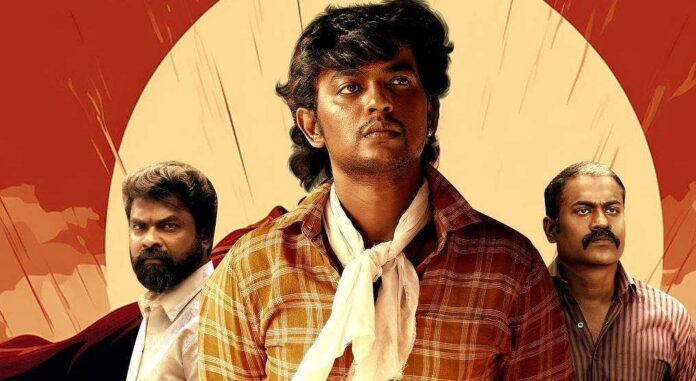Familiarity breeds contempt. Vijay Kumar’s new film Fight Club suffers from this issue throughout its runtime. Despite the excessive hard work of cinematographer Leon Britto and editor Kripakaran Purushothaman to spice up the film, the writing never rises to the occasion to support these supreme technical crafts.
“A skilled soccer player becomes a reluctant participant and eventually a ruffian in a gang war, which sparks off after the murder of a guardian angel of the hood.” Doesn’t this plotline ring a bell? If the sport here is replaced by carrom, it would probably read like the summary of Vetri Maaran’s Vada Chennai. Of course, there is no harm in drawing inspiration or having a storyline that shares plot points with a cult success. But an effective screenplay and a couple of stand-out character arcs in the script can steer our minds off comparisons and immerse us in the tale that is in the offering. But, whenever Fight Club ceases to remind us of Vada Chennai, it gives us hints of inspiration from other films like Alphonse Puthren’s Premam and Pa Ranjith’s Madras.
Director: Abbas A Rahmath
Cast: Vijay Kumar, Avinash Raghudevan, Saravanavel, Kaarthikeyan Santhanam, Shankar Thas
Almost all characters feel emotionally distant to us and we route for none in Fight Club. Though men from both gangs are beaten up, arrested and even die in various scenes, we feel indifferent to their plights. Instead of focussing on the interpersonal equations of these lead characters, most of the runtime is spent on the fight sequences. This ideally shouldn’t be a complaint considering the film’s title, but these much-anticipated sequences also fail to excite us as they majorly come across as glorified commotions sans the excessive violence.
Apart from these primal issues, I was puzzled by the film shifting its base to Kerala for the school and college portions of Selvam (Vijay Kumar) and gang, while the entire story is set in the outskirts of Chennai. Creative choices to elevate the mood of a scene are all okay unless they don’t disrupt the overarching core of the film. But the needless, jerky location jumps feel like a major disservice to the rooted film the makers were aiming for. Above all, the romantic track set in these locations turns out to be the weakest link of the film, reducing the romantic interest to a set prop. It is still unsettling to realise that the debutant Monisha Mohan only has one line of dialogue to deliver in the entire film.
Despite having able performers in the form of Vijay Kumar, Avinash Raghudevan, Saravanavel, Kaarthikeyan Santhanam and Shankar Thas, the director fails to tap into their full potential. Instead of the unamusingly meandering non-linear screenplay, a straightforward approach with ample scenes for these talents would have given Fight Club a major fillip.
Fight Club has a very predictable storyline, and its screenplay too doesn’t catch you off-guard. We can see the twists come towards us a mile away. However, the film is presented by Lokesh Kanagaraj, whose name is accompanied by the Lokiverse theme in the title card and a sizeable number of co-viewers around me started gossiping theories about the film belonging to LCU, and this was initially the one question that kept a lot of them excited in the theatre. By the end of Fight Club, director Abbas makes it clear that the film doesn’t belong to any universes. Quite ironically, instead of being disappointed by the realisation, the entire theatre including me gave a huge sigh of relief.
#Technical #prowess #fails #redeem #dull #predictable #action #drama #Cinema #express

